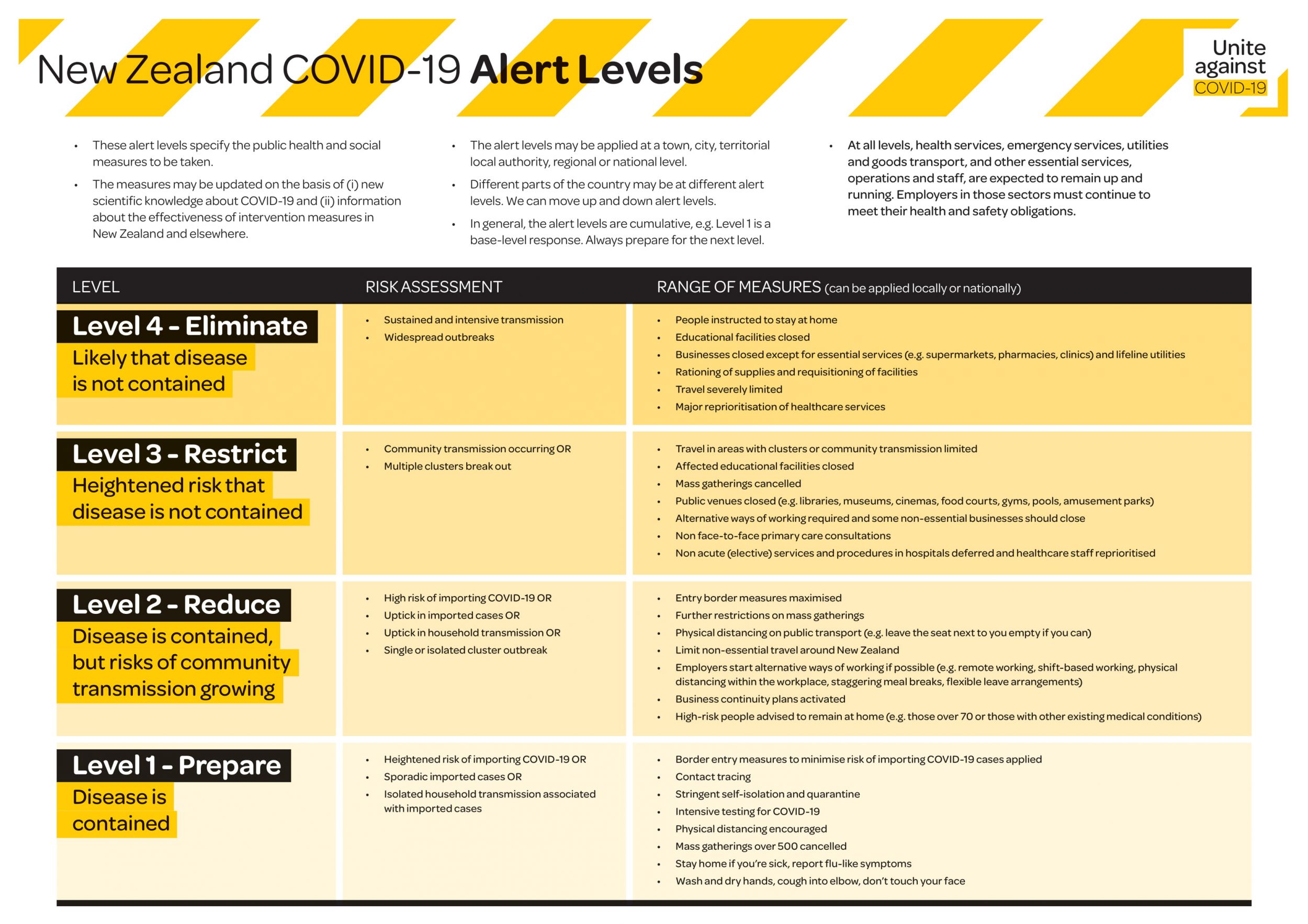Prime Minister Jacinda Ardern has made a statement to the nation about the impact of COVID-19 on New Zealand.
The government has announced a four-level Covid-19 alert system.

Alternative ways of working
High level messages
Alternative ways of working are encouraged.
We all have to go about life very differently, including our work life.
Employers should start alternative ways of working if possible – for example remote working, shift-based working, physical distancing within the workplace, staggered meal breaks and flexible leave arrangements.
We need to be practical and sensible about this, but we do need to change our practices.
If you are at high-risk, you are advised to stay at home regardless. This includes if you are over 70, have a compromised immune system or have underlying health conditions.
Why?
This is an important measure to slow down the spread of the disease.
Slowing down the spread of the disease is vital to protect people’s health and to ensure our health system can cope and look after New Zealanders that become sick.
What employers should do
Employers should allow employees to work from home if they can, and start other alternative ways of working:
- Move to measures like shift-based working, staggered meal breaks and flexible leave arrangements
- Encourage physical distancing in your workplace
- Stop employees coming to work if they are unwell
- Maintain high levels of hygiene in the workplace
- Advise your customers and suppliers not to come in if they are sick
- Support staff wellbeing, particularly those people with existing medical conditions
- Activate business continuity plans. There is a step-by-step guide to getting your plan sorted on the business.govt.nz website: here(external link).
Information for businesses about Government financial support for wage subsidies and leave related to COVID-19 is available on the Work and Income website: here
Specific information for exporters and importers, and about travel, employment, health and safety is available on the business.govt.nz website.
Guidance for businesses about mass gatherings: here
Changing how we get around
High level messages
We are asking everyone to limit your movement around the country. This means cutting non-essential domestic travel. This will help us track and contain any spread of COVID-19.
Physical distancing on public transport is critical to slowing the spread – it’s about keeping a safe distance from others.
On public transport, try to stay at least one metre away from other passengers, and leave the seat next to you empty if you can.
It is important to cough or sneeze into your elbow.
Wash and dry your hands before and after your journey.
Working from home and alternative ways of working will reduce the amount of people on public transport.
Keep as much space between you and others. This means staying at least 1 metre away from others, where possible.
Where possible, sit in a window seat in a row by yourself.
Why?
This is about slowing down the spread of the disease.
This is vital to protecting people’s health and ensuring our health system can cope and look after New Zealanders that become sick.
Will there still be domestic flights?
We are asking that people not undertake any non-essential travel around New Zealand. If you need to fly, maintain social distancing and wash your hands before and after your flight.
Can I still catch public transport around town?
Yes, but remember to wash your hands for 20 seconds before and after you have been on public transport and cough or sneeze into your elbow. If there is space on your bus or train, try to stay at least one metre away from other passengers, and leave the seat next to you empty if you can.
At risk people
Who is at risk?
Over 70
Older people often have underlying health issues, including respiratory issues that make them more vulnerable to this virus.
People with medical conditions
Underlying medical conditions can make you more vulnerable to this virus.
In particular, people with respiratory conditions, such as COPD (Chronic Obstructive Pulmonary Disease), heart conditions, high blood pressure, kidney problems and diabetes.
People undergoing a treatment for cancer and blood conditions
As treatments for cancer and blood conditions effect people’s immune systems, this makes them more vulnerable to COVID-19.
Pregnant women
Health experts do not yet know if pregnant women are impacted by COVID-19 in the same way as other people. However, pregnant women experience changes in their bodies that may increase their risk from some infections.
Residents of aged care facilities
Aged care facilities are susceptible to rapid transmission of viruses like this. Residents are more susceptible to illnesses due to their age and they are also more likely to have underlying health conditions.
Migrant and refugee community
Migrant and refugee communities are more likely to have underlying health conditions and language barriers to healthcare, which may make them more vulnerable to the effects of this virus.
https://www.beehive.govt.nz/release/nation-steps-covid-19-alert-level-2
Regards,
Tendekai Rodney Mugadza
Multicultural New Zealand
Level 1, 192 Tinakori Road, Wellington 6011
Ph: 04 916 9177 |
